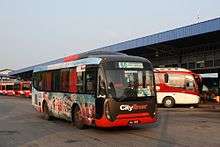Buses in Klang Valley
Buses in Klang Valley are run by many transport operators and have many uses. There are nine stage bus operators within the Klang Valley, including Kuala Lumpur, which together operate about 3,200 stage buses.[1]
Local buses
Local buses (not to be confused with Rapid KL's Local Shuttle) or stage buses are run by the integrated network operator Rapid KL as well as privately owned Metrobus, Causeway Link, Len Seng, Selangor Omnibus, Setara Jaya , Cityliner (KKBB), Wawasan Sutera, Nadi Putra, & Sri Indah.
Metrobus and Rapid KL are the two main bus companies within the boundaries of Kuala Lumpur from 2006 to 2015. As there is no difference between public transport in Kuala Lumpur and public transport for the whole Klang Valley, most of the other bus companies other than Rapid KL and Metrobus are normally confined to Klang Valley areas that are outside the boundaries of Kuala Lumpur.
The largest operator, Rapid KL, operates 179 bus routes along with the Ampang Line, Sri Petaling Line and Kelana Jaya Line.
Bus stops

There are several major bus stops in Kuala Lumpur.
Important bus interchange
List of City bus interchanges:
- Hub Lebuh Pudu (Formerly Kotaraya / Mydin at Jalan Silang / Sinar Kota / Metrojaya; Near Puduraya)
- Hub Pasar Seni (Formerly Terminal Jalan Sultan Mohammad)
- Hub Medan Pasar (Serve for Jalan Ipoh Corridor & Jalan Pahang Corridor Bus)
- Hub Titiwangsa bus (Rapid KL buses only) - Interchange with Ampang Line, Sri Petaling Line and KL Monorail
- LRT / KTM / ERL Bandar Tasik Selatan or Terminal Bersepadu Selatan
Express and long-distance buses: (to other states in Malaysia including Singapore and Southern Thailand
- Pudu Sentral
- Hentian Duta
- Terminal Bersepadu Selatan (TBS)
The old and former bus interchanges and terminals:
- Pasaramakota bus station (Demolished by MRT Corp built for MRT Pasar Seni)
- Terminal Putra (Defunct)
Bus operators
RapidKL by Rapid Bus
Rapid Bus is the largest bus operator in the Klang Valley. Currently, there are 179 routes which integrates with Klang Valley's Rail Systems. The bus routes operated by Rapid Bus were previously operated by Intrakota Komposit Sdn Bhd, a subsidiary of DRB-HICOM Bhd; and Cityliner Sdn Bhd, a subsidiary of Park May Bhd. In 2005, Rapid KL buses carried around 190,000 passengers daily. Many of the other bus companies listed here except for Metrobus are slowly being phased out and being defunct or unpopular with commuters due to Rapid Bus.
Selangor Omnibus Sdn Bhd
Selangor Bus serve between Kuala Lumpur City Centre and places like Kuala Selangor, Sungai Buloh, Kepong, Bestari Jaya, Ijok and etc.
Cityliner by Konsortium TransNasional

Konsortium Transnasional Berhad (KTB) is the largest private stage bus operator in Malaysia, serving people in states namely Kedah, Penang, Pahang, Kelantan, Negeri Sembilan and Selangor. With a fleet of more than 700 buses, ranging from mini to double-decker, the red and grey signature colour of Cityliner has been a major mode of transport, connecting rural and urban areas, villages to towns ferrying thousands of passengers every day of the year. From school going children to housewife buying groceries and workers commuting to work, with trips schedule tailored to the local needs, Cityliner has become part of daily life for many Malaysians.
Cityliner has pioneered the stage bus industry with many firsts. With the rising environmental concerns and increasing fuel prices, Cityliner was the first in the country to opt for Compressed Natural Gas (CNG) technology which allows the buses to run on an alternative source of fuel commonly known as Natural Gas.
Cityliner was also the first to introduce double-decker stage buses. The additional seating capacity enables Cityliner to carry double number of passengers of single deck at one time thus making it the most efficient among the stage bus providers.
Len Seng

Len Seng Omnibus was formed in the early of 60s. The company now mainly serve the areas of bus services 252 (Section 10 Wangsa Maju - Hub Munshi Abdullah). Len Seng initially operates nine bus services, now left one bus services 252
Nadi Putra
Nadi Putra is a bus service that is owned by Perbadanan Putrajaya. It operates mainly around Putrajaya and Cyberjaya, as well as trunk buses that link from Putrajaya to Kuala Lumpur, Bandar Saujana Putra and Seri Kembangan.
Causeway Link
Causeway Link was founded in 2003 and is based in Johor Bahru, Johor. Apart from its services in Johor and Singapore, the company mainly serves the areas in Port Klang, Klang and Puchong, Selangor. The company has previously served in the Kepong and Segambut areas of Kuala Lumpur until its transfer to Selangor Omnibus in July 2017.
Klang Valley Bus Network Revamp
The Klang Valley Bus Network Revamp or 'Greater Kuala Lumpur Bus Network Revamp (BNR) is a plan implemented by Land Public Transport Commission (SPAD) in Klang Valley and Greater Kuala Lumpur of Malaysia, starting from 1 December 2015.[2]
The aim of this plan is to improve the stage bus services in these areas by providing commuters with higher bus service frequency that covers a wider area, which will subsequently improve its reliability.[2]
Under this system, existing bus corridors were reorganized into eight bus corridors:[2]
- Ampang Corridor
- Cheras Corridor
- Damansara Corridor
- Jalan Ipoh Corridor
- Jalan Pahang Corridor
- Klang Lama Corridor
- Lebuhraya Persekutuan Corridor
- Sungai Besi Corridor
See also
References
- ↑ "GTP Annual Report 2013" (PDF). Jabatan Perdana Menteri. p. 57. Archived from the original (PDF) on 20 October 2014. Retrieved 16 October 2014.
- 1 2 3 "The Bus Network Revamp (BNR)". Suruhanjaya Pengangkutan Awam Darat (SPAD). Retrieved 1 January 2017.